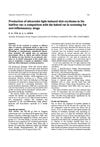 9 citations,
November 2020 in “Journal of Inflammation Research”
9 citations,
November 2020 in “Journal of Inflammation Research” Inflammation affects hair loss; anti-inflammatory treatments may help.
 7 citations,
February 2019 in “Journal of pharmacological sciences”
7 citations,
February 2019 in “Journal of pharmacological sciences” Bazhengsan reduces inflammation and tissue growth in chronic prostatitis.
 7 citations,
January 2018 in “Indian Journal of Pharmacology”
7 citations,
January 2018 in “Indian Journal of Pharmacology” Algerian Carthamus caeruleus L plant has anti-inflammatory properties, heals wounds effectively, and may help with hair growth.
[object Object] 6 citations,
April 2012 in “Muscle & nerve” Recognizing the link between certain autoimmune disorders and neurological conditions can improve diagnosis and treatment.
 4 citations,
November 2021 in “Pharmaceuticals”
4 citations,
November 2021 in “Pharmaceuticals” Paeonia lactiflora and Poria cocos extracts can potentially increase hair growth and reduce hair loss symptoms by lowering testosterone and inflammation levels.
 3 citations,
November 2021 in “Journal of The American Academy of Dermatology”
3 citations,
November 2021 in “Journal of The American Academy of Dermatology” Androgenetic alopecia, a genetic disorder affecting up to 50% of adults, is caused by an excessive response to androgens leading to hair follicle shrinkage. Treatments include FDA-approved drugs, other therapies like low-dose oral minoxidil, and hair transplantation.
 3 citations,
October 1979 in “Laboratory animals”
3 citations,
October 1979 in “Laboratory animals” Hairless rats are good for testing anti-inflammatory drugs, similar to haired rats, without needing to remove fur.
 2 citations,
February 2021 in “The Pediatric Infectious Disease Journal”
2 citations,
February 2021 in “The Pediatric Infectious Disease Journal” Hair loss may be a delayed side effect of Multisystem Inflammatory Syndrome in children after COVID-19.
[object Object]  1 citations,
September 2023 in “Applied sciences (Basel)”
1 citations,
September 2023 in “Applied sciences (Basel)” Ishige sinicola extract may help prevent muscle atrophy through its antioxidant and anti-inflammatory effects.
1 citations,
January 2021 in “European Journal of Inflammation” Methylated flavonoids may effectively reduce depression and inflammation caused by finasteride.








